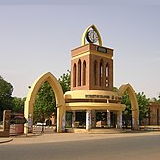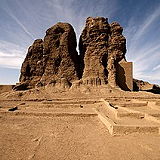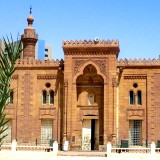
|
Khartoum, Sudan Sudan Last Updated: 08/13/2023 |
| Khartoum is the capital and largest city of Sudan, a country located at the confluence of the Blue Nile and White Nile rivers, making it a strategic location in terms of transportation and trade. As the political, economic, and cultural center of Sudan, Khartoum plays a significant role in the country's history, administration, and development. It had a population of 5,274,321 in 2021. | |
| Capital City: Khartoum serves as the capital city of Sudan and is the seat of government, housing key government offices, ministries, and diplomatic missions. Three Cities: The city is part of a larger metropolitan area known as "Khartoum Three" or "Khartoum Triad," which consists of Khartoum, Omdurman, and Khartoum North. These cities collectively form the political and economic heart of Sudan. Economy: Khartoum is a major economic center in Sudan, with various sectors contributing to the city's economy, including agriculture, manufacturing, services, and trade. Cultural Diversity: Khartoum is home to a diverse population, reflecting Sudan's various ethnic and cultural groups. This diversity is evident in the city's architecture, cuisine, and cultural events. Historical Sites: The city has historical sites that reflect Sudan's rich history, including the National Museum of Sudan, which houses an impressive collection of archaeological artifacts. Blue Nile Bridge: The Blue Nile Bridge connects Khartoum with Khartoum North and is an iconic landmark that crosses the Blue Nile river. Nile Street: Nile Street, along the banks of the Nile, is a major thoroughfare with a mix of modern buildings, hotels, restaurants, and shops. Omdurman and Khartoum North: Omdurman and Khartoum North are part of the greater metropolitan area and are known for their historical significance, markets, and cultural attractions. Transportation: Khartoum has an international airport, Khartoum International Airport, which connects the city to various domestic and international destinations. River Transportation: The Nile River plays a vital role in transportation and trade, with boats and ferries being used for both practical purposes and tourism. Cultural Events: The city hosts cultural festivals, music performances, and exhibitions that showcase Sudanese art, music, and traditions. | |
Wikipedia
Sudan » Khartoum
Place » City

|
Sudan Place » City Sudan is a country located in northeastern Africa, bordered by Egypt to the north, the Red Sea to the northeast, Eritrea and Ethiopia to the east, South Sudan to the south, the Central African Republic to the southwest, Chad to the west, and Libya to the northwest. Sudan is known for its diverse landscapes, rich history, and cultural heritage. It had a population of 45.7 million people as of 2022. 63 views 💖 1Sudan |

|
Grand Mosque Place » Temple The Grand Mosque of Khartoum, also known as Al-Fateh Mosque, is one of the prominent landmarks and most eldest mosque in Khartoum, Sudan. It holds cultural, religious, and architectural significance within the city. The Grand Mosque holds a special place in the hearts of the people of Khartoum and serves as a testament to the city's Islamic heritage and cultural identity. 262 views 💖 1El Baladiya Ave, Al Khurtum, Sudan |
Write a Review :
Khartoum, Sudan
|
|